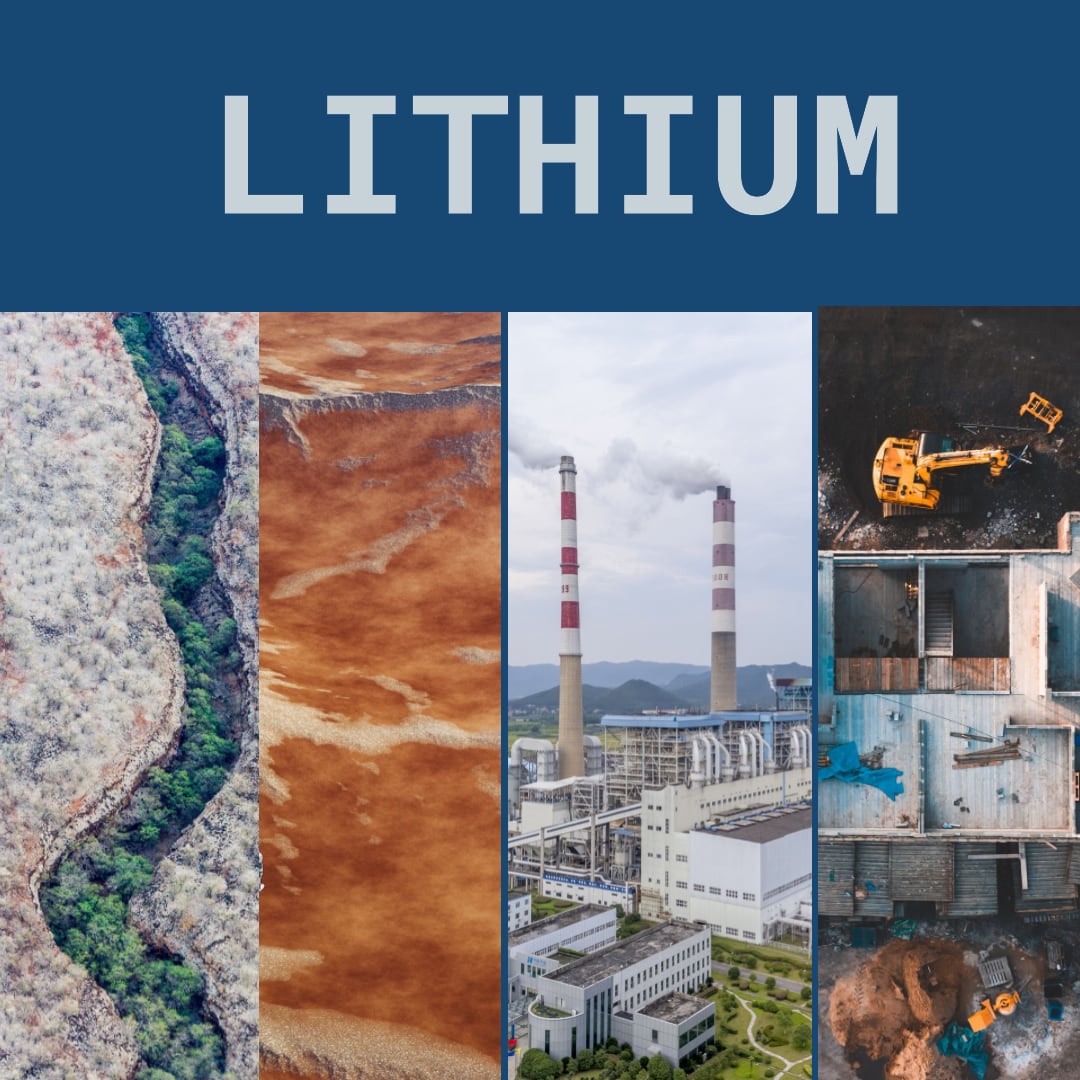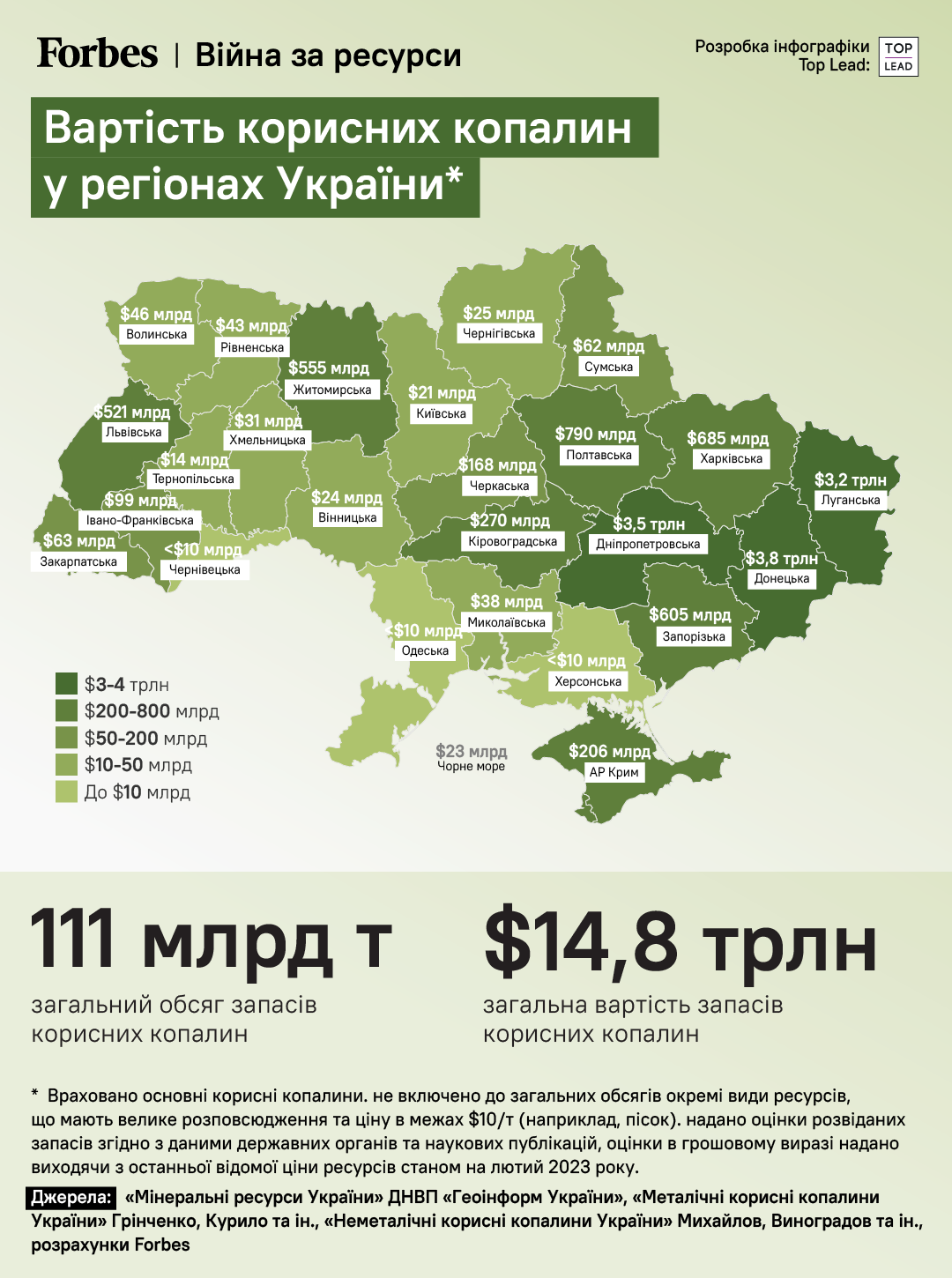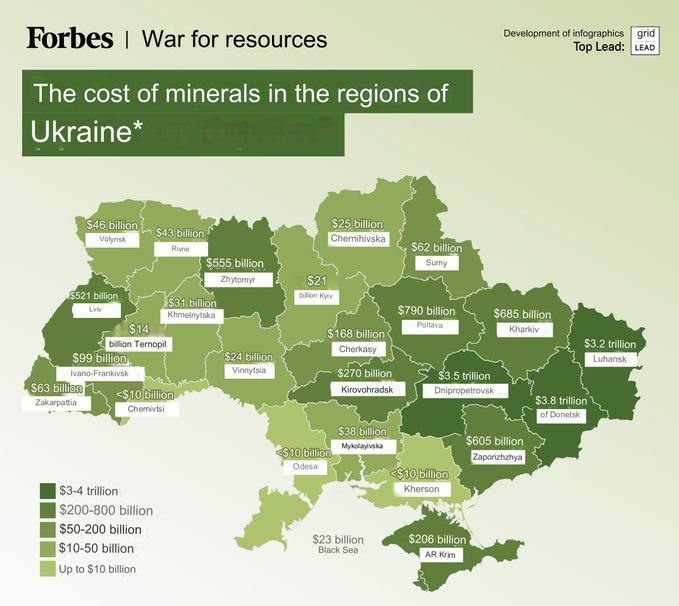Dynamics: Mastering Values, Leadership,
and Change» (ISBN-13: 978-1405133562)

The Financial Times article "The green treasure chest buried in Ukraine"[1] tells us that the war in Ukraine has brought intense suffering, but its vast mineral wealth could prove pivotal well beyond its borders. Ukraine sits on one of Europe's largest troves of critical minerals essential for electric vehicles, batteries, and renewable energy technologies. According to researchers at the National Academy of Sciences of Ukraine, the country holds an estimated 500,000 tonnes of lithium, edging Portugal as Europe's largest lithium resource.
More broadly, Ukraine has commercially viable deposits of most key industrial minerals, with total reserves potentially worth up to $11.5 trillion, according to Ukrainian government documents surveyed by Foreign Policy magazine [2]. The country is rich in titanium, iron, neon, nickel, and other materials deemed critical by the International Energy Agency for the global energy transition and technology growth. FORBES Ukraine magazine provided infographics [3] on how these natural resources are located across the country's regions.


Since Russia's invasion, control over these Ukrainian mineral deposits has become a fierce geopolitical battleground. But Ukraine's untapped mineral wealth could prove a vital economic engine for the country and its Western allies as the world moves toward electric transport, clean energy systems, and greater sustainability. Having alternative sources to rival China's current dominance of critical mineral supply chains is also strategically important.
With proper investment and partnerships, Ukraine's treasure chest of essential minerals and metals could substantially benefit its postwar reconstruction and help fuel the 21st-century green economy far beyond its borders. The war has underscored the geographic luck and potential power of Ukraine's mineral endowment.
Assumptions about the significant motives and causes for Russia's war in Ukraine, based on quotes from the article "The green treasure chest buried in Ukraine":
Control of critical minerals and metals:
"Sadly, the Russian authorities are also keenly aware of the geopolitical significance of those minerals, and many reserves are sitting in Russian-controlled land." This suggests that Russia seeks to control Ukraine's mineral wealth, which is strategically important for technology and economic power.
Securing economic growth:
"Friends of mine working with the Ukrainian forces in places such as Zaporizhzhya are now braced for long, ugly battles as Kyiv tries to seize back eastern regions such as Donbas." This implies that battles over the Donbas region likely aim to control industrial production capacity and resources to boost Russia's economy.
Preventing Ukraine's westward integration:
"Before Moscow’s invasion, Ukraine was drawing up plans to develop these resources by offering outside investors tax breaks and investment rights." This indicates that Russia moved to prevent Ukraine from aligning economically with the West and outside investors.
Gaining geopolitical power:
"Unfortunately, those plans did not get very far. “It’s an incredibly important issue about the war that people don’t understand,” one senior US official told me recently." This suggests that controlling Ukraine's minerals is geopolitically significant for Russia's power ambitions.
Controlling Ukraine's minerals is geopolitically significant for Russia's power ambitions.
Lithium production in Ukraine could be environmentally damaging unless proper safeguards are implemented. Some key points:
- Ukraine is not part of the EU, so it would not be bound by EU regulations that aim to limit the environmental impacts of lithium mining and processing. For example, the EU's Industrial Emissions Directive sets emissions limits for industrial activities, including mining.
- Lithium mining can use much water, impact local water tables, and produce chemical byproducts. Without oversight, these impacts could be severe in Ukraine.
- From a logistical standpoint, it would be much more advantageous for Europe to source lithium from Ukraine rather than Afghanistan. Ukraine is proximal to major EU manufacturing hubs, while Afghanistan is remote and lacks infrastructure.
- Sourcing lithium from Ukraine could significantly shorten and simplify supply chains for European renewable energy companies. The cost savings on transport could be substantial.
- But thorough life cycle analyses are needed - a Ukraine lithium industry with poor environmental standards could negate the transport-related benefits.
Overall, Ukraine's lithium resources create an opportunity for Europe.
Here are some key points and how they could impact environmental standards post-war:
- Ukraine's GDP may contract by 35-45% in 2022 due to the war, severely impacting economic output and the population's living standards.
- In this weakened economic state, Ukraine will be desperate for revenue and investment post-war. This could lead to pressure to fast-track mining projects.
- Ukraine may feel forced to relax environmental regulations to quickly restart mining operations, especially lithium, as global demand rises.
- Oversight from the EU and ties to Western companies may not be enough to prevent rushed, environmentally-risky mining if Ukraine's debt burden is too severe.
- Strong incentives and aid tied to green mining practices will be needed to ensure Ukraine prioritizes sustainability despite its economic woes after the war.
So in summary, Ukraine's ballooning debts and economic crisis pose a real risk that environmental standards could be sidelined post-war unless safeguards are implemented.
Here is an analysis of the Spiral Dynamics color schemes reflected in the actions of various parties mentioned in the article "The green treasure chest buried in Ukraine":
| Actor | Spiral Dynamics Color | Quotation |
| Conservative parties in Europe | Purple | "Spanish voters went to the polls this weekend in an election that left Alberto Núñez Feijóo, the leader of the rightwing, notably strengthened. He, like other conservatives in Europe, has run on a platform that seeks to slow the green transition." |
| UK Conservative party | Red/ Blue | "Meanwhile, in London there are growing calls inside the UK Conservative party for a rollback of net zero measures, following recent parliamentary by-elections." |
| Polls showing public concern about climate change | Green | "In a survey this month, for example, 62 per cent of British adults said they felt “very” or “somewhat” worried about climate change" |
| China | Red/ Orange | "China is the world’s third-largest lithium producer and has also been on an “acquisition blitz” for lithium projects worldwide." |
| Western leaders | Orange/ Green | "To return to lithium: China is the world’s and has also been on an “acquisition blitz” for lithium projects worldwide. China still accounts for about 50 per cent of all batteries installed in electric vehicles globally — more than Europe and the US combined, according to Morgan Stanley." |
| Ukraine | Orange/ Green | "Unfortunately, those plans did not get very far. “It’s an incredibly important issue about the war that people don’t understand,” one senior US official told me recently." |
| Russia | Red | "Sadly, the Russian authorities are also keenly aware of the geopolitical significance of those minerals, and many reserves are sitting in Russian-controlled land" |
In summary, the conservative parties reflect Purple security concerns, China exhibits Red power and Orange opportunism, while Western leaders and Ukraine aim for Orange economic gains and Green sustainability. The multi-level perspectives illustrate the complexity of geopolitics and energy transition.
Some potential trajectories Ukraine could evolve after the war through the lens of Spiral Dynamics:
Beige - Ukraine's basic infrastructure and institutions are severely damaged. Rebuilding safety, food, shelter, and health systems will be a primitive survival priority.
Purple - With society disrupted, traditional values like security, ethnic identity, and belonging could strengthen as people seek stability.
Red - Power struggles among oligarchs and militias could unfold if law and order break down after the war.
Blue - Restoring law, order, and public institutions will be vital for stability and rebuilding.
Orange - Ukraine's huge economic challenges may necessitate free-market reforms and entrepreneurship.
Green - With reconstruction, Ukraine can rebuild around sustainable systems and renewable energy.
Yellow - Managing a fractured postwar society and the economy will require nuance, complexity, and social integration. Wisdom must guide reforms.
[1] https://www.ft.com/content/ad32d42e-d75e-4344-9e51-623616b2b0e3
[2] https://foreignpolicy.com/2022/05/06/ukraine-mineral-deposits-critical-war-economy-energy-transition/
[3] https://forbes.ua/money/viyna-za-resursi-forbes-otsiniv-vartist-vsikh-korisnikh-kopalin-ukraini-25042023-13255
